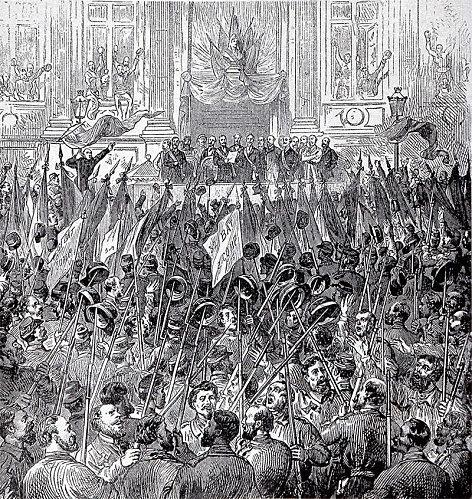Mel Bienenfeld
Posted April 7, 2020

I’d like to offer an additional response to Donna Cartwright’s piece of February 25. I was glad to see Solidarity’s reprinting of the New Politics article Kit Wainer and I wrote on the transition to socialism, and appreciated Donna’s engaging with it so thoughtfully.
Kit has, in my opinion, responded adequately to Donna’s examples of Reconstruction and the New Deal as instances when radical change occurred under the existing United States Constitutional structures, implemented partly by electoral means. What I want to discuss here is Donna’s characterization of our article as an “overly pessimistic assessment of the possibilities for radical change posed by the existing constitutional structure”.
Donna begins by separating the achievement of social democratic reforms from that of socialism itself (i.e., the abolition of capitalist production relations). Our article was meant to address only the latter. She may, then, substantially agree with us: she writes that the possibility of achieving socialism through electoral means is “uncertain, but very dubious”.
But Kit and I may not have made our position sufficiently clear. Donna refers to our positing the “obstruction” of socialist measures by the courts, and points out that the US courts eventually approved New Deal measures which had been vociferously opposed by business and the right wing. But we were not arguing that the courts block all radical reform measures. Rather our meaning was that an intentional effort to implement measures that would include the socialization of capitalist property (even “by degrees,” as per the Communist Manifesto) would necessarily be declared unconstitutional. The Constitution is meant to protect property; and the extreme measures embodied in any legislation meant to begin a transition to socialism would in fact be beyond the powers the Constitution grants to the government. The role of the courts — themselves not easily controllable by elections, if at all — would simply be to ratify that fact.
We also did not intend to take a pessimistic stance regarding possibilities for some degree of radical reform to be won electorally, in combination with powerful mass movements demanding them:
[W]e…believe that any electoral success of an independent workers party would represent a positive step toward an eventual socialist revolution. Some reforms will be achievable by this means, others not.
More specifically, we were writing in response to positions recently expressed by Eric Blanc and others regarding the type of “rupture” that the abolition of capitalism would require (or even whether a “rupture” would be necessary at all). In his debate with Charlie Post, as reported in Jacobin, Blanc addresses the question of how a working-class political party might use the legislative power of the existing state in socializing capitalist property:
The core idea of this strategy is that in conditions of parliamentary democracy, the path to socialism is very likely going to have to pass through the universal suffrage election of a workers’ party to government. Such a government, in alliance with struggles from below, would seek to democratize the existing state and implement anticapitalist changes in the economy, leading the ruling-class minority to resort to antidemocratic sabotage of the elected government and the revolutionary process. Defeating this reaction — through the power of mass action as well as the actions of our elected representatives — would culminate in a complete break with capitalist control over the economy and the state.
Blanc goes on to criticize the “dual power/insurrectionary strategy,” implicitly arguing that the substitution of organs of power beyond the existing state are not a realistic, or necessary component of a socialist transition.
Where we disagree with this view is not on whether workers’ parties can achieve a high degree of electoral success for some period of time, nor whether such an outcome should be vigorously fought for. It is also not on whether mass action is required to implement radical reforms, nor on whether major non-electoral clashes, with violent responses from the state repressive apparatus, are likely to occur. Rather what we believe is that it is not possible for one arm of the state — the Federal legislative branch and perhaps the Presidency — to use its authority first, to purge, democratize, and (at least) neutralize other state institutions, and, second, to destroy the economic basis of capitalist power by appropriating and socializing the means of production. For those purposes, other instruments of power have to be created.
Put differently, what we were doing is echoing Marx’ conclusions after the Paris Commune: that the working class cannot use the existing state machinery for its own purposes. We specifically avoided referring to this “authority,” however, especially when writing for a somewhat broader audience, in order to re-pose this question as concretely as possible in the setting of the US political system of the 21st Century. But our conclusion is the same as that of Marx: In order to introduce its own social regime, the working class will need to replace capitalist state institutions with institutions of its own creation — workers’ councils.
